#FSS Polls
Explore tagged Tumblr posts
Text






*3: Original Colors - Ray with Norman's Hair, Emma with Ray's hair, Norman with Emma's hair **4: Original Colors - Ray with Emma's Hair, Emma with Norman's hair, Norman with Ray's hair ***5: Ray with Norman's hair and color, Emma with Ray's hair and color, Norman with Emma's hair and color ****6: Ray with Emma's hair and color, Emma with Norman's hair and color, Norman with Ray's hair and color *****Emma can pull off black or white hair, but neither of the boys can pull off being ginger
#ignore that my edits are shit they're just a basic concept yfm#If you say canon without altering any sort of aesthetics for Other you are a coward#The Promised Neverland#Yakusoku no Neverland#YnN#TPN#TPN Polls#FSS Polls#FSS Shenanigans#Long Post#TPN AU#TPN Hair Discourse#Hair Swap AU#Full Score Trio#TPN Ray#TPN Emma#TPN Norman#Norrayemma#Noremray#TPN S1#TPN Promo Art#Introduction Arc#Escape Arc#Norman#Ray#Emma
38 notes
·
View notes
Text
Mamoru Kanbe blatantly on the NE and no homo agenda lmao

(Minerva Confidential Report from the S1 Blu-ray)
Given Shirai's sentiments shown in the mystic code book and the 2018 Demizu-Kobayashi interview from the year the anime was in production, I do think Sugita was purposely coy and obfuscating with the "but not romantically" comment, but still interesting how there was some back and forth on that approval.
i will forever hate how the anime made it seem like norman ONLY cared about emma and not ray like his nightmare, in the anime he only held her but in the manga he went for them both. Also when he broke down after the entire demon thing both emma AND ray hugged him. its like they read norman liked emma and went "oh yeah lets completely forget about ray"
#the live action movie is also pretty bad re: this from what I've seen#changes being made so things can flow better and to keep things fresh for new and old fans is understandable#but I cannot deal with them dumbing down/taking things from Emma#to prop Norman up as the golden boy of the Japanese popularity polls to even more of a degree than the anime#semi-canonical main cishet m/f ships are a hellavu drug#Escape Arc#TPN S1#TPN S1e05#TPN 015#Minerva Confidential Report#Kaiu Shirai#Mamoru Kanbe#TPN Interviews#FSS Chatter#TPN Salt#Full Score Trio#Norrayemma#Noremma#Norray#aidlyncanon
112 notes
·
View notes
Text
Evil Canadians
[[This is an excerpt of an alternate history role playing game that involved psychics, wizards, and a cold war that never ended I wrote in between 2002-2004. This is an edited part of the section about Canada that several Canadian friends asked to see...]]
Canada is the world’s second largest country and occupies most of the North American Land mass, sharing with the United States of America what was once the world’s longest undefended border. Though not extensively militarized until the Russo-American War, going as far back as the early 1990s many of the border provinces coming under control of the Dominion Unity Party (DUP) began paramilitary patrols to augment the official border crossing points. Canada was settled as British and French colonies in the 17th and 18th centuries. France surrendered to Britain its colony of New France, an area that composes present-day Quebec and Ontario at the Treaty of Paris in 1763.
----
The Ungava Incident
For almost forty years United States Air Force Strategic Air Command (SAC) nuclear-armed bombers flew armed over Canadian territory near the Arctic Circle on routine patrols. These aircraft, by the 1980s aging B-52s with a host of electrical problems, flew from bases within the Continental United States, looped over the northern reaches of Canada, and than landed again at their bases in middle America. Twice in the 1960s SAC B-52 on similar routes crashed with nuclear weapons on foreign soil. The first occurred on January 17, 1966 near Palomares, Spain during an in-flight refueling accident, three bombs were scattered over farmer’s fields and one in the ocean. All four were recovered and the residents of the small Spanish town paid nearly $800,000 in compensation. Just over two years later on January 22, 1968 another B-52 crashed near Thule Air Force Base, Greenland after a fire broke out in the navigator’s compartment. Three hydrogen bombs were scattered across the ice, and one melted through and sunk to the bottom of Baffin Bay, unrecoverable. The incident over Greenland, a Danish possession, caused massive protests in Denmark, and briefly strained relations between the two countries.
These were nothing in comparison to the December 12, 1984 explosion of at least one (though some theorize that it may have been as many as three) hydrogen bomb over the Ungava Peninsula, in northern Quebec. The explosion vaporized the B-52 that the bombs were believed to have come from, killing the crew, and making investigation of the cause of the explosion nearly impossible. Because the region was sparsely populated, mostly by isolated fishing villages, no one knows exactly how many people died, though estimates by both the Canadian and United States governments place the direct death toll from the explosion to be around 450. This does not include the thousands of cases of radiation poisoning from fallout in Quebec, the Hudson Bay, Newfoundland and Labrador, as well as fisheries in the North Atlantic and as far away as western Europe.
The United States Air Force immediately sent teams to help relocate survivors and those in the worst affected areas, but the estimated $4,000,000 in compensation has been considered inadequate and insulting by many Canadians and some of those eligible for settlements have refused them in favor of civil suits filed in American courts against the Air Force. The Department of Defense has attempted to have the suits thrown out citing national security concerns, but several Federal judges have kept it alive, even after decades of delay. The mysterious deaths of one of those judges, and of a prominent Ungava survivors advocate are widely suspected to be the result of U.S. military covert operatives.
The Reagan administration dismissed concerns that the incident might permanently soured relations with the northern neighbor. Other American observers wondered though, as nearly fifty percent of Canadian Air Force personnel were recalled from joint programs such as the North American Aerospace Defense Command (NORAD). Though many of those same officers returned in the following years, but military cooperation between the neighbors has never been the same. Polls carried out in the United States ten and twenty years after the incident show close to forty percent of the American people did not even know that it had occurred, and listed Canada as one of the United States’ closest allies around the world.
-----
The Friendly Dictatorship?
The Prime Minister of Canada has what are often considered extraordinary powers in comparison to other western leaders. Because of a system of strict party discipline within the Canadian House of Commons, an elected member faces great difficulty in voting against the party line (set by the Prime Minister). If any member of the Prime Minister’s governing party votes against any new legislation, he or she may be expelled from the party. An expelled member must sit as an independent, without the right to ask a question, raise any issue before the Parliament, and stands little chance of winning re-election without the party’s resources. These measures mean that members of the governing party almost always follow the will of the Prime Minister. This was best exemplified by former Prime Minster, Pierre Trudeau, who referred to the backbenchers of the (than ruling) Liberal party as “trained seals” and the opposition backbenchers as “noblies when they are fifty yards away from the House of Commons.” The lack of checks and balances as theoretically seen within the US system has lead some to question such power, especially with the unexpected term of Walter Bechmann’s Dominion Unity Party, which has held the office since 2003
The major counterbalance to the power of the Prime Minster of Canada are near autonomous powers of the provincial premiers. They are required to agree to any constitutional change, and must be be consulted over new domestic initiatives within their area of responsibility. Unsurprisingly, traditionally the most difficult primeir to deal with has been the Priemer of Quebec.
The Rise of the DUP
Traditionally there have been two major national parities within Canada, the Liberal Party of Canada, the Conservative Party of Canada (or predecessors under other names), with a large regional party the Bloc Québécois following behind. None of these players took much notice as a small upstart, the Dominion Unity Party (DUP), began to win power on the provincial level in Saskatchewan and Alberta. Rising out of the movements collectively known as “Prairie Socialists” the DUP advocated traditional values, wide ranging social programs, a strong military, and a resistance to what they characterized as the cuddling of the Quebec separatists by Ottawa.
The economic and ecological disaster that was the Ungava Incident, the lack luster American response, and Ottawa’s inability to force the issue lead to a growing sense that Canada had seeded too much of its responsibilities to the United States. If Ottawa would not keep the French in line, or Washington from walking all over the country, than someone would. And that someone, the DUP claimed, was them. Throughout the late 1980s and early 1990s the DUP gained control of all of Western Canada on the Provincial level, and became the official opposition party after the collapse of the Progressive Conservatives.
Who done it?
The leak of the incriminating file on Liberal Party funding to the CBC have become the Deep Throat of Canadian political history. Both their origins and even their authenticity have been vigorously questioned (and denied). Some leading theories include:
That the deputy prime minister leaked the documents in an effort to force Chrétien to resign in favor of former finance minister Paul Martin. He was taken by surprise when Martin did not win the election and has dropped out of public life.
The Bloc Québécois leaked them after obtaining them by means unknown. Thinking that they would have an easier time working with a Conservative government, or at least a better chance of winning the next independence referendum, it blew up in their face when instead of getting the Tories they ended up with their worst nightmare.
One of the Canadian intelligence or security services leaked the document—the finger is usually pointed at the FSS—either out of patriotism or out of cynical and very illegal manipulation of the political process.
One thing is clear to those that are familiar with Jean Chrétien. Few believe that he actually knew about the dirty dealings with the American companies. If the documents were legitimate to begin with.
----
The government of Jean Chrétien came under fire in 2003 as documents began to surface in the press linking the Liberals to campaign funding directly by American corporations with ties to the Department of Defense. The implication being, though never quite proven, that an agreement was in the works to arrange for the Ungava lawsuits to be settled or dropped entirely in return for the illegal funds. The exact origins of the leaked documents have never been established. So angry was the Canadian electorate that not only were the Liberals swept from power, but the Conservatives also took a major loss, leaving the last man standing, the quiet and boring former Premier of Saskatchewan, Walter Bechmann.
Following the election night carnage as the Liberals went from holding a long-standing majority to six seats, barely half what would be needed for official party recognition on the federal level. Still weakened from their collapse under Kim Campbell in 1993, the Conservatives held only 20 seats. And with the effective merger of the New Democratic Party into the DUP, the official opposition party was the separatist Bloc Québécois. Given the DUP’s strong anti-French stances it has made for ugly fighting in Parliament, but with little effect on Prime Minister Bechmann’s policy goals.
Most observers speculate that after years of Liberal rule with virtually no other option, the image of the effective, hard working, non-flaboyant man from Saskatchewan has endeared Beckman with the Canadian people. While the more conspiracy minded suggest that the inability of the other national parties to organize may be linked to more sinister interference. The Bloc, always willing to scream about government and DUP misdoings, points to the Canadian Federal Security Service, which had long been battling Quebec nationalists and had closely allied themselves with the DUP on its rise.
The French Question
Conflict between Canada’s Francophone minority and Anglophone majority is hardly new, though the extensive efforts made on behalf of the federal government to help preserve the French language and French Canadian culture is relatively recent. Unfortunately equalizing language and granting Quebec some special status has not stopped an upswing in separatist activity, violent and non-violent. The first eruption of what have been several decades of sustained violence began on October 5, 1970 with a string of bombings, kidnappings, bank robberies, and attempted assassinations, all the work of a Marxist-Leninist group, Front de Libération du Québec (FLQ).
Like many similar groups, West Germany’s Red Army Faction, Italy’s Red Brigade, and the American Weather Underground, the FLQ was made up primarily of middle class born again radicals who would not hesitate to attack the class structure as much as the Anglos. Two weeks into the emergency Prime Minister Pierre Trudeau ordered the Army into the streets to enforce Martial Law in Quebec under the controversial War Measures Act. The overwhelming force, mass arrest of those associated with the FLQ (and their families), and the stretching of the organization’s resources beyond what they could handle for all practical purposes destroyed the organization. The deaths of some of the detainees in the custody of the army and RCMP, and the disappearance of others have left a sinister note over the ending of the emergency. Rumors still surface decades later of prominent Quebecois, made to disappear during the period, in the custody of particularly vindictive elements of the government.
The next wave of extreme violence occurred in 1990 when a new group, calling itself the Armée de Libération du Québec (ALQ) and trading on the reputation of their similarly named predecessor began targeting Java Works, a nation wide specialty coffee chain which like many corporations continued to use its English name in Quebec. Well-dressed young people, of an age to be university students, used automatic rifles to commit mass murder of the patrons and employees at one Saint-Georges shop. Similar attacks followed within days, with brutality and efficiency associated to a particular terrorist leader soon identified as Amanda Legardeur, the daughter of an upper class Montreal family.
Though relatively brief, the spree lasted just over a month; the brutality displayed cleared the fence sitters out of the way, leaving only those who would clearly choose between a sovereign and independent Quebec, and a united Canada. That was of course, what Legardeur had intended, and the cultivation of a young woman who looked similar to her so that she could shoot her in the head to fake her own death was a small price to pay in her game. It took CSIS and FSS nearly a decade to agree that she was indeed, still alive, though once they had, her legend grew even more. Today she is the most wanted woman in Canada, believed to be not only armed, but possessing the organization and leadership skills to make her a one person national security threat.
In response to the perceived failure of the moderates, the increasing violence of the extreme separatists, and what many particularly among the rank and file of the ruling DUP see as excessive allowances to the French, there has been a backlash. With only the exception of the United States, the primary focus of the Canadian Federal Security Service—the most ruthless, and effective of the competing agencies—has been what is internally called “the French Question.” Some wonder though, if repressive and often highly illegal methods will only divide the country more, just as they did for the British in Northern Ireland.
The federal government believes—not without reason—that the violent separatists are being backed by east bloc communist countries that would use an independent Quebec as a base of operations on the Americans doorstep. Unwilling to see the country torn apart, or to be used by either superpower in cynical games of brinksmanship, the Canadian government has begun to look at solving all their problems on a larger scale.
American Relations
The Canadian government, and to some extent the Canadian people, have understood the true form of the American government longer than any other county in the world. For them it is like having a window on the great superpower, seeing more up close in American news and American television—not to mention in frequent visits to the states to avoid high Canadian taxes—than anyone in the United Kingdom or the Europe ever does. And certainly more than anyone ever gets to see of the Americans’ rival the Soviet Union.
Over the years though, at least from the American side, this familiarity has bread contempt. Washington sees Ottawa, and more importantly in the Americans case, the Pentagon sees them as a joke. The quaint socialist country to the north whose military is more focused on tracking down stray penguins and who police and intelligence services can be characterized by The Rocky and Bullwinkle Show’s Dudley Do-Right. The fact that there are no penguins in Canada has not entered into the American’s calculations. The American public’s view is not much more nuanced, seeing their continental neighbors as unerringly polite, and with the firm belief that every Canadian citizen can kill, skin, and gut a grizzly bear with their bare hands.
The view south from Ottawa is quite a bit more nuanced, though the Canadians have learned a hard lesson about the sometimes friendly sometimes vicious pit-bull they have been planted next to. The the view has been common enough going all the way back to repeated American invasions during the War of 1812, it came to a nasty point when the indifference which the American military seemed to treat the accidental nuking of their country. As one Strategic Air Command general at the Ungava Board of Inquiry commented to another when he did not know that his microphone was on, “All they have are trees and rocks up there, what’s the big deal?”
A firm belief has developed, especially among the security and intelligence communities (with the notable exception of CSIS, who have a close working relationship with the Americans) that there is indeed a major military and security threat to Canada, the Canadian way of life, and even the lives of every Canadian citizen.
Their neighbors to the south.
A Fair Deal, an Even Playing Field, a Slippery Slop—The Canadian Psychic Experiments
Like many countries around the world the Canadians are intimately familiar with the uses and abuses of the paranormal within the intelligence community. As a commonwealth country they have long been familiar with the sorcerer viziers that have advised the crown for centuries. However as with many things that come with the British heritage, the mother country has far more use of the community than the former imperial possessions.
The ruling DUP have an innate distrust of sorcerers owing to a distrust of anything supernatural that gives one man an advantage over another. It is a political, philosophical, and religious distrust that has placed the country’s small sorcerer community at odds with the government… though not yet at war. The leading wizard in the country is the queen’s representative, and a master of the mysteries of the mind, Karen Clarke. She has focused primarily on checking the power of Prime Minister Beckmann and the agenda that most people have not yet discovered behind the party and by extension the government’s actions.
The difficulties between the sorcerers and the government are nothing though, in comparison to the outright war that has been declared on psychic talent within the Dominion. The idea that among the citizens exist a population—small as it may be—who can commit the worst violations on a person’s mind and body without any control by rule or law offends the prairie socialists very nature. In the view of the party psychics are to be monitored, controlled, and eventually eradicated from society as a threat to the rest of the human race.
Most within the power structure would chose to do this through “curing” the afflicted, many of whom themselves would gladly submit at first for any chance to lead a normal life. The main arm of this goal, like so many other things within the party’s plans, has been the Canadian Federal Security Service (FSS). The service itself though, has mixed feelings about the mission. Those that know the ultimate goal also know that enemy countries, particularly the communist nations, have been using their own psychics against Canada. The cleverest among them have begun to play both sides against the middle.
Section C of the FSS has been responsible for the beginnings of an extensive tracking network that will eventually use the DNA markers to identify psychics. Or so they hope. One problem they have discovered—and one that the Soviets have been independently finding at the same time—is that the genes that control psychic gifts are not in the same place for each subset of gifts. The genetic code that turns on a telepath’s ability to read minds is not the same gene that allows a remote viewer to see beyond his body or a pyrokinetic’s ability to set the world ablaze. Complicating matters even farther, some suspect that multiple genes can trigger psychic powers.
In addition to the genetic studies, extensive drug trials have been carried out in an attempt to dampen or control psychics so that they can be returned to society and not imprisoned for life. Unfortunately, as the Americans discovered almost half a century before, psychoactive drugs are themselves a tricky business. It is difficult to determine outside of the subject’s self-reporting if the drug has dampened the powers. The only way of independently determining any drugs affects has been testing on pyrokinetics and telekinetics, whose powers manifest physically. This can be very dangerous, as many test subjects react badly to the conditions within Section C’s hospitals. If not outright killed by the psychics (which usually results in the death of the psychic), the staff often report frightening and wild displays of power as the scared and often mentally ill telekinetic or pyrokinetic looses the concentration and control needed to keep their world together.
As of now, there is no effective drug therapy to control psychic talent.
Those Who Serve
A relative few Canadian psychics are employed by the FSS to battle those of other nations in order not to leave the country vulnerable to attack. This was made abundantly clear during the 1988 Calgary Winter Olympics when several east bloc psychics were brought into the country in order to give their athletes an edge in the medal count. The scheme was discovered when a West German coach who had escaped the East recognized a Stasi colonel who had tortured his brother to death among the East German Olympic Committee’s figure skating staff. After a confrontation the night before the figure skating long program, both the West German coach and the East German psychic were expelled from the country.
Unlike the Americans, who rarely use government psychics and have left the practice entirely to corporations and other private enterprises, and the Soviets who have fostered a system of the widespread utilization of psychics, the Canadians keep their mental attack dogs on a very short leash. Each psychic has a strong willed normal agent, known within the community as a Controller (telepaths often have two to prevent one from falling under the spell of their charge). This officer is responsible for all operations that the psychic is used in, and in the field has the authority to summarily eliminate any that become impossible to control. As could be expected, a physical psychic (telekinetics and pyrokinetics) or a mental specialist like a telepath is much harder to control than even the most powerful remote viewer or precognitive.
The Personalities Involved
Her Excellency, the Right Honourable Karen Mendelsen-Clarke, Governor General and Commander-in-Chief in and over Canada. A Vancouver born academic with impeccable credentials, her recent appointment by the Queen as her representative in Canada caused a near constitutional crisis as it went against the advise of Prime Minister Bechmann. The Queen’s growing concern about Bechmann’s politics and leadership of the country led her to appoint Clarke, a Cambridge educated sorcerer with a specialization in the powers of the mind. Publicly she is polite and friendly to the PM, but privately she has been hard nosed and difficult, threatening to withhold royal consent from legislation and implying that she might dismiss several of his ministers. In an unprecedented step, she has also formed her own guard battalion for protection after a suspicious car accident nearly took her life. With the traditions of the reactivated Black Watch (Royal Highlanders of Canada), they are seen by the DUP as her private army and viewed with great suspicion. She is divorced with no children.
The Right Honorable Walter Bechmann, Prime Minister of Canada, Leader of the Dominion Unity Party. A long time provincial politician in his home province of Saskatchewan, he served for nearly a decade as a Progressive Conservative backbencher in the provincial assembly before recognizing a wave of political change in time to ride it to the top. He ended up sweeping the Provincial Party elections when the DUP was first created and then surprisingly took the DUP to the top spot in Saskatchewan. Eventually the Party attained national membership, and gained power in other provinces. After several years as the Premier of Saskatchewan, he retired from politics briefly, before coming back for Federal politics to become the national leader for the party. Often seen in the press as bland and dense, he is actually an astute observer and can be very charismatic when he wants to be. And he usually wants to be charismatic in private. During Question Period many a young MP have learned to underestimate the old man at their peril. He has a wife and three daughters.
David Cherier, Premier ministre du Québec, leader of the Parti Libéral du Québec. A lawyer by trade, David Cherier specialized in defending those swept up in various federal anti-terrorism sweeps. He was first elected to Parliament as Progressive Conservative before returning to Quebec to become the Minister for Natural Resources. Hard work, competence and charm brought him to the head of his party and with the PLQ’s win in elections to the position of Quebec Premier. Though not a separatist himself, he is a strong Quebec nationalist, and has fought vigorously against the policies of Walter Bechman in his attempt to roll back concessions made to Quebec. His sometimes ally in this has been Governor General Clarke, but she has also sided with the prime minister when it suited her. He is generally considered a good man, if relatively unsophisticated when matching wits with the PM. There have been three assassination attempts on Cherier’s life, one when he was Minister for Natural Resources, presumably by separatist groups such as the ALQ, though they have not claimed responsibility.
0 notes
Text
Muhammadu Buhari Official Biography and Profile
New Post has been published on https://www.politicoscope.com/muhammadu-buhari-official-biography-and-profile/
Muhammadu Buhari Official Biography and Profile
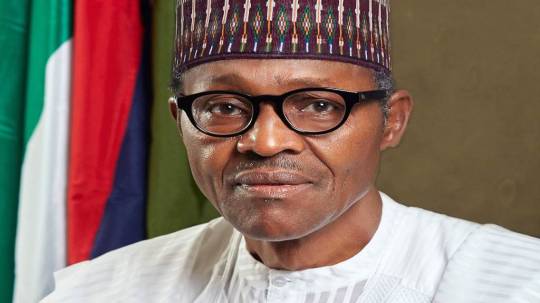
Muhammadu Buhari was born on 17thDecember, 1942 in Daura, Katsina State to Adamu and Zulaiha Buhari. Muhammadu Buhari was raised by his mother, following the death of his father when he was about four years old. He had his primary school education in Daura and Maidua from 1948 to 1952, before proceeding to Katsina Middle School in 1953.
Subsequently, he attended the Katsina Provincial Secondary School (now Government College, Katsina) from 1956–1961, where he earned his West African School Certificate. President Buhari was married to Safinatu Yusuf from 1971 to 1988, and since 1989 to Aisha Halilu. He is blessed with ten children.
Military Career He joined the Nigerian Army in 1961 when he was admitted to the Nigerian Military Training College, Kaduna. He underwent the Officer Cadets training at Mons Officer Cadet School in Aldershot, England from 1962 to 1963, and was commissioned as Second Lieutenant in January, 1963. He attended the Nigerian Military College, Kaduna for the Platoon Commanders’ Course from 1963-1964. He was then appointed Platoon Commander of the Second Infantry Battalion in Abeokuta.
In 1965, he attended the Mechanical Transport Officers’ Course at the Army Mechanical Transport School in Borden, England. Further military trainings included the Defence Services Staff College, Wellington, India in 1973, and the United States Army War College, from June 1979 to June 1980.
As a highly regarded officer, Muhammadu Buhari held several key command and staff, as well as political appointments during his illustrious military career. These included:
Military Secretary;
Member, Supreme Military Council;
Military Governor of the North Eastern State;
Federal Commissioner of Petroleum Resources;
Chairman, Nigerian National Petroleum Corporation;
General Officer Commanding, 4thInfantry Division and General Officer Commanding, 3rd Armoured Division.
The military coup of December, 1983 led to the emergence of General Muhammadu Buhari as Head of State and Commander-in-Chief of the Nigerian Armed Forces, a position in which he served until August 1985.
Retirement General Buhari was appointed Executive Chairman of the Petroleum Trust Fund (PTF) by the Abacha administration in 1994. The main consideration in appointing him to this position was his strict discipline and incorruptibility.
The PTF under General Buhari intervened directly in six major areas:
Construction/maintenance of roads;
Water supply;
Supply of educational materials and rehabilitation of educational infrastructure;
Health;
Food supply; and other projects.
The impact of this interventionist agency was felt across the entire nation in its four and a half years of existence.
Buhari in Politics Driven by a profound sense of patriotism and commitment to national service, General Buhari entered politics in 2003, following Nigeria’s return to a democratic dispensation in 1999. He joined the All Nigeria People’s Party (ANPP) and contested the presidential election on its platform that year. He lost to the presidential candidate of the People’s Democratic Party (PDP) Olusegun Obasanjo. Undaunted by defeat, Buhari continued his political struggle, and on December 18th, 2006, he emerged as the consensus presidential candidate of the All Nigeria People’s Party for the 2007 elections.
His main challenger in the April 2007 presidential polls was the ruling PDP candidate, Umaru Yar’Adua. In the election, Buhari officially scored 18 percent of the total votes cast, against 70 percent for Yar’Adua. Buhari rejected the results and in a post-election statement, Yar’Adua affirmed that the polls were indeed less than free, fair and credible. After Yar’Adua assumed office, the ANPP agreed to join his purported government of national unity, but Buhari denounced the agreement.
In March 2010, Buhari left the ANPP and formed, with some of his supporters, the Congress for Progressive Change (CPC). General Buhari was nominated as the CPC presidential candidate on April 16th, 2011 for that year’s general election.
He ran against the then incumbent, President Goodluck Jonathan of the ruling PDP, Mallam Nuhu Ribadu of the Action Congress of Nigeria (ACN), and Ibrahim Shekarau of the ANPP, and other candidates of smaller parties. Using the platform of the CPC, a newly formed party without much finance and essential party structures in the states, Buhari was able to garner 12, 214, 853 votes, coming second to Goodluck Jonathan of the PDP, who polled 22, 495, 197 votes.
The 2015 Presidential Election The 2015 General Elections were quite unique and interesting in redefining the character of the Nigerian political system. The previously inchoate opposition to the dominant ruling PDP was able to form, consolidate and mature.
The Action Congress of Nigeria (ACN), the All Nigerian People’s Party (ANPP), The Congress for Progressive Change (CPC), a breakaway faction of the ruling PDP known as the “new PDP”, and several disenchanted members of the All Progressive Grand Alliance (APGA) merged in 2013 to form the All Progressive Congress (APC).
It was this new party, the APC, much stronger in terms of resources and support base as well as having a pan-Nigerian appeal, that provided the platform upon which General Buhari contested the 2015 presidential election.
The perception of most Nigerians about the character of General Buhari greatly influenced the outcome of the 2015 elections. Over the years, General Buhari had cut the image of an incorruptible leader and had spurned several past opportunities to enrich himself. His campaign slogan of “Change” was widely embraced by Nigerians who longed for a new direction after 16 years of PDP rule at the national level.
General Buhari therefore won a popular victory in the presidential elections of March 28, 2015 and was sworn into Office as President, Commander-In Chief of the Armed Forces, Federal Republic of Nigeria on May 29, 2015.
Honours Honours held by Muhammadu Buhari include:
Grand Commander of the Federal Republic (GCFR)
Commander of the Federal Republic (CFR)
Defence Service Medal (DSM)
National Service Medal (NSM)
General Service Medal (GSM)
Loyal Service and Good Conduct (LSGCM)
Forces Service Staff (FSS)
The Congo Medal
Global Seal of Integrity (GSOI)
Family Muhammadu Buhari is married to Aisha Muhammadu Buhari.
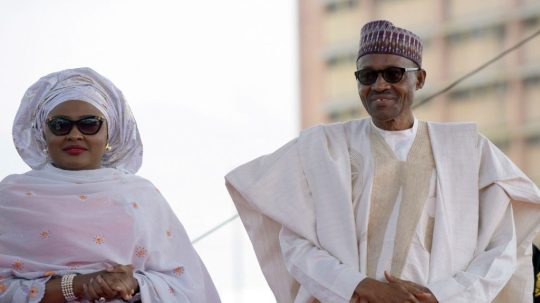

– Muhammadu Buhari Biography and Profile (State House, Nigeria)
#Aisha Buhari#Aisha Buhari Biography and Profile#Aisha Muhammadu Buhari#Aisha Muhammadu Buhari Biography and Profile#Biography and Profile#Muhammadu Buhari#Muhammadu Buhari Biography#Nigeria
0 notes
Text
Mamoru Kanbe blatantly on the NE and no homo agenda lmao

(Minerva Confidential Report from the S1 Blu-ray)
Given Shirai's sentiments, I do think Sugita was purposely coy and obfuscating with the "but not romantically" comment, but still interesting how there was some back and forth on that approval.
And idk if I remember this correctly but I think all three of them were holding hands at some point but in the anime Ray didn't hold hands with them
This scene from chapter 28 that was altered to mimic a similar shot in the opening in episode 9?


Cloverworks pushing away the entire Norray subplot was crazy (well platonic norray but you get me)
Like after Norman found out Ray was the spy (it's really ironic tbh I love it >_<) he started to realize that he loved and appreciated Ray way more than he initially thought like even during that scene he was like "damn he was really risking it all for us..." "All of this for our sake..." He was like really touched (also before the confrontation he asked Ray why he thinks the traitor is betraying them and asked Emma if they should take the traitor with them during the escape all because he was looking for any reason to see the best in Ray) and literally after that he kept defending him with his LIFE every time they told someone Ray was the spy (first Emma then Don and Gilda) like "HE DID IT FOR OUR SAKE" OK DAMN CHILL...
and he was literally so fixated on the "to make sure YOU BOTH don't get killed" slip up he was on a mission to confirm his suspicions for like the rest of his stay in Grace Field and in his letter to Emma he was like "but Ray is amazing..." and "please take care of Ray... and the others I guess" like OK man
Ray was going to die so Emma and Norman could live and Norman literally did that for him instead like you can't make this shit up he literally adores Ray ok? He loves him so much he'd do anything for him HE LITERALLY SWITCHED PLACES WITH HIM BECAUSE HE THOUGHT RAY ALREADY SUFFERED ENOUGH FOR THEM and he kept thinking about him during his stay at Lambda too he didn't say "I miss her" he said "I miss them"
Meanwhile Cloverworks was like removing Ray from everything for Noremma's sake like what... Norman was hugging both of them in his nightmare... And idk if I remember this correctly but I think all three of them were holding hands at some point but in the anime Ray didn't hold hands with them and I know season 2 doesn't exist but they excluded Ray from the full score TRIO hug with Norman when he was breaking down and made him not gaf STOP FORCING NOREMMA!!!!! THERE WAS LITERALLY A SUBPLOT ABOUT NORMAN LOVING RAY!!! FUCK YOU!!!!!!!
#the live action movie is also pretty bad re: this from what I've seen#changes being made so things can flow better and to keep things fresh for new and old fans is understandable#but I cannot deal with them dumbing down/taking things from Emma#to prop Norman up as the golden boy of the Japanese popularity polls to even more of a degree than the anime#Escape Arc#TPN S1#TPN S1e10#Minerva Confidential Report#Mamoru Kanbe#FSS Chatter#TPN Salt#Noremma#Norray#duckietine
55 notes
·
View notes
Text
*Yes, but only because they're young and they don't want to go through with the potentially painful process of having them removed until they're older. **This is very much a case-by-case matter, but I don't have strong opinions or headcanons for specific characters about it. ***This is very much a case-by-case matter, and I do have strong opinions or headcanons for one or a few specific characters regarding this subject.
Further discussed in this post.




(S1 Episode 1 | S2 Episode 8 | Chapter 56 | Chapter 69)

(There is Nothing You Can Do About it, Now by @bblueraven-and-fandoms14)
And spoilers for khgnh's Fragments focusing on the topic under the cut:






#TPN Polls#FSS Polls#The Promised Neverland#Yakusoku no Neverland#TPN#YnN#FSS Shenanigans#FSS Chatter#TPN S1#TPN S2#TPN S1e01#TPN S2e08#TPN 056#TPN 069#Introduction Arc#Search for Minerva Arc#Cuvitidala Arc#Farm System#TPN Fanfic#bblueraven-and-fandoms14#𝑇ℎ𝑒𝑟𝑒 𝑖𝑠 𝑁𝑜𝑡ℎ𝑖𝑛𝑔 𝑌𝑜𝑢 𝐶𝑎𝑛 𝐷𝑜 𝐴𝑏𝑜𝑢𝑡 𝑖𝑡‚ 𝑁𝑜𝑤#khgnh#𝐹𝑟𝑎𝑔𝑚𝑒𝑛𝑡𝑠#Really like that Ray with the raven tattoo cover-up hc aaaaaah I go back and forth on this so much#also like REN either getting their partners' first initials tattooed on their wrists (one on each wrist)#or somewhere else on their persons#I also like dabbling with them having tattooed wedding bands on their ring fingers#assuming they've worked out how to make them not fade as badly by the 2050s/2060s like it's the future. also magicks
43 notes
·
View notes
Text
*All the farms have English as their primary language of communication, but each farm has a different secondary language they also teach. **I don't have general headcanons for the farms as a whole, but I headcanon specific human characters as multilingual besides Ayshe and Norman speaking the old demon language (share in the reblogs/replies)
Headcanon and not canon because it's more interesting and because for simplicity sake's I think Shirai would say everyone living in the demon world speaks and writes in English by default for reasons below the cut:
• The Western setting was chosen to intentionally make the anachronistic aspects of the farms feel more natural:

(Mystic Code Book Chapter 1)
• The majority of the legible text shown not related to the original faith is in modern English in the Japanese raws for both humans and demons (them using international Morse code and sounding it out in English as opposed to using Wabun, the signs in Goldy Pond being in English) due to Shirai writing for a modern audience:
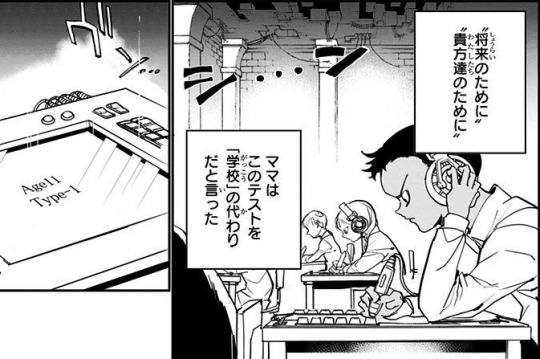
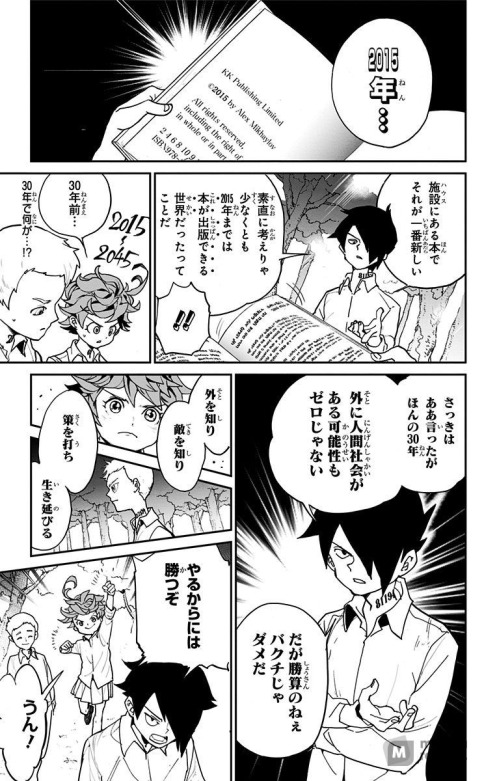
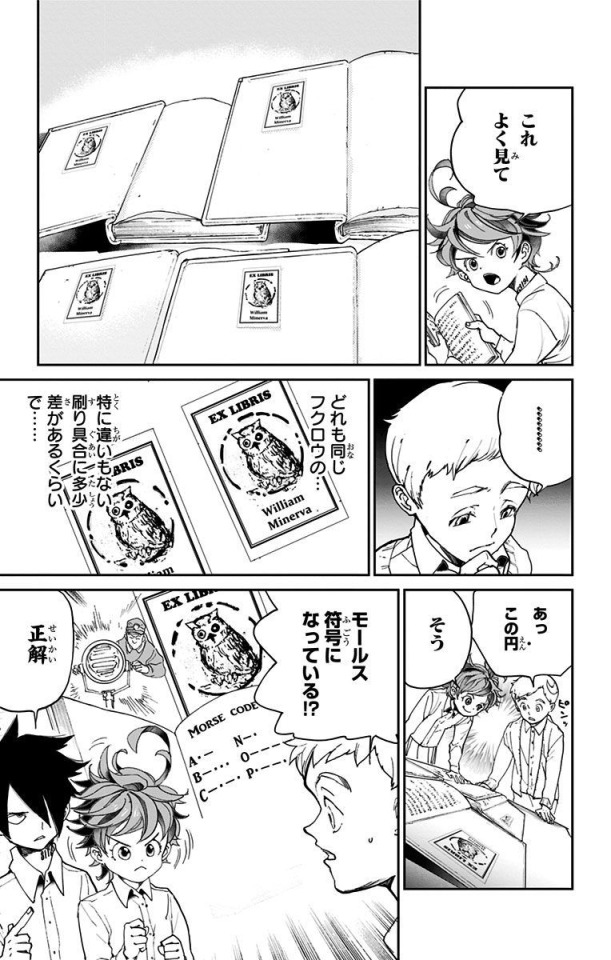
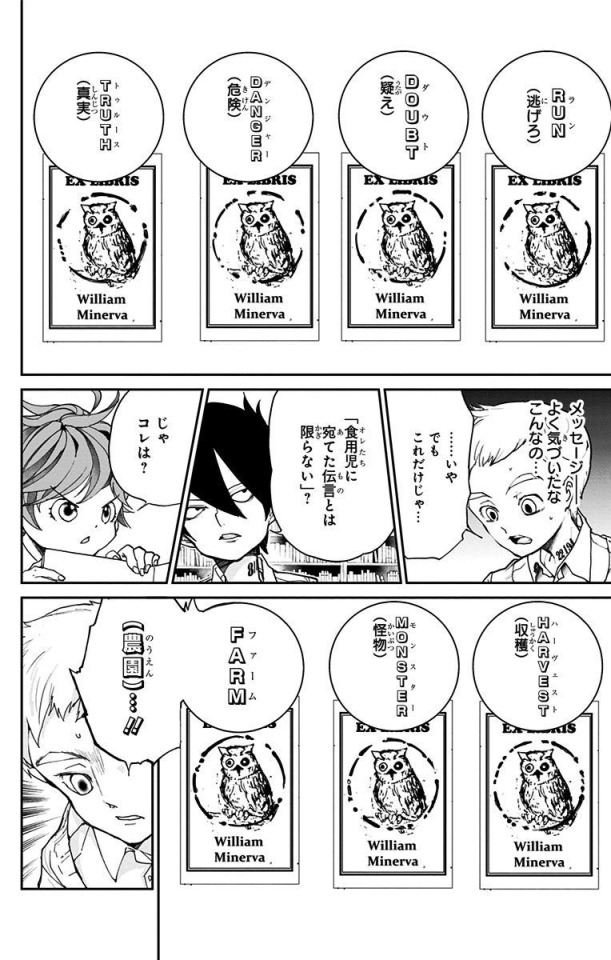
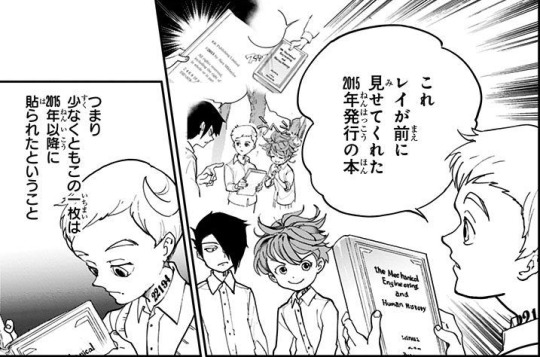
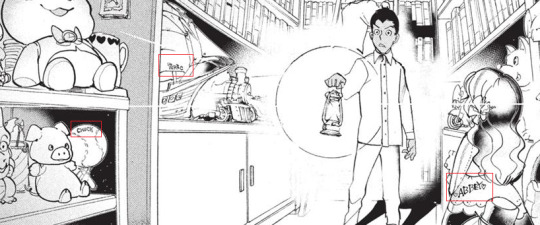
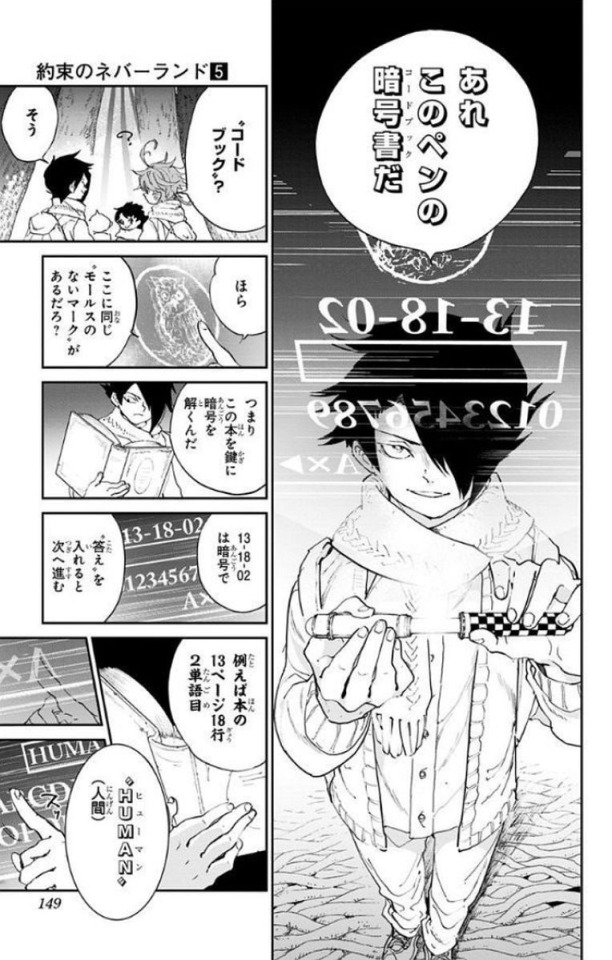
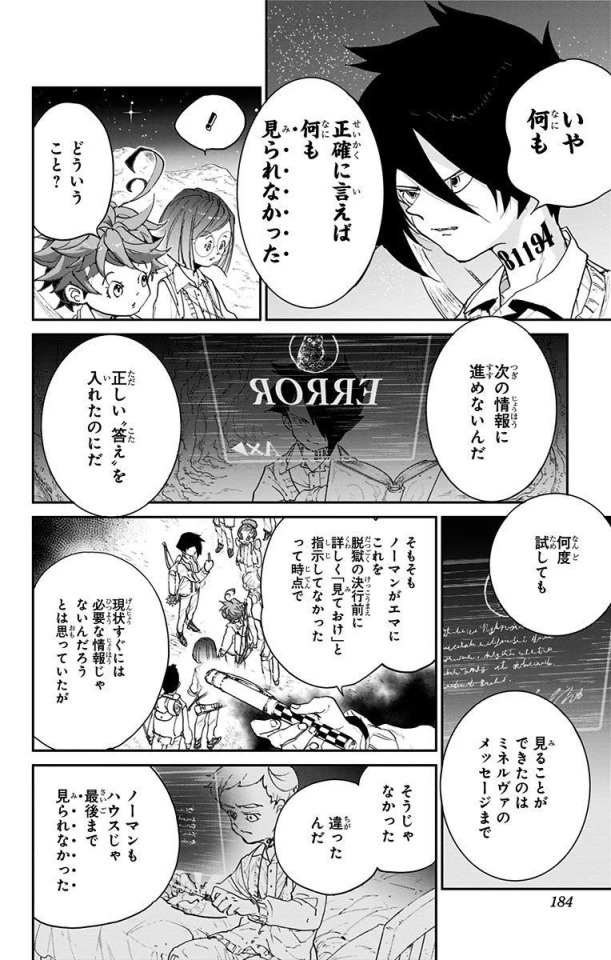
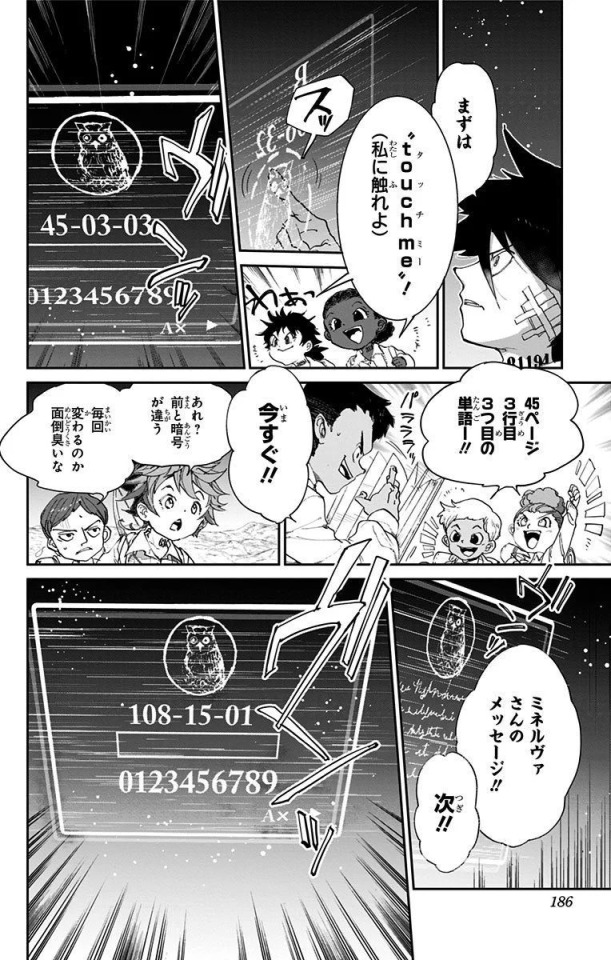
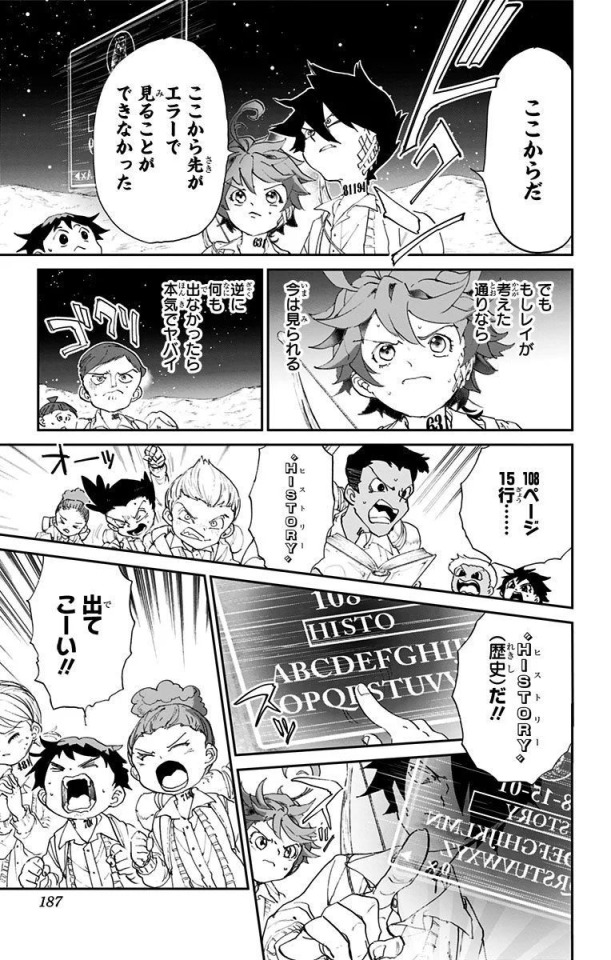
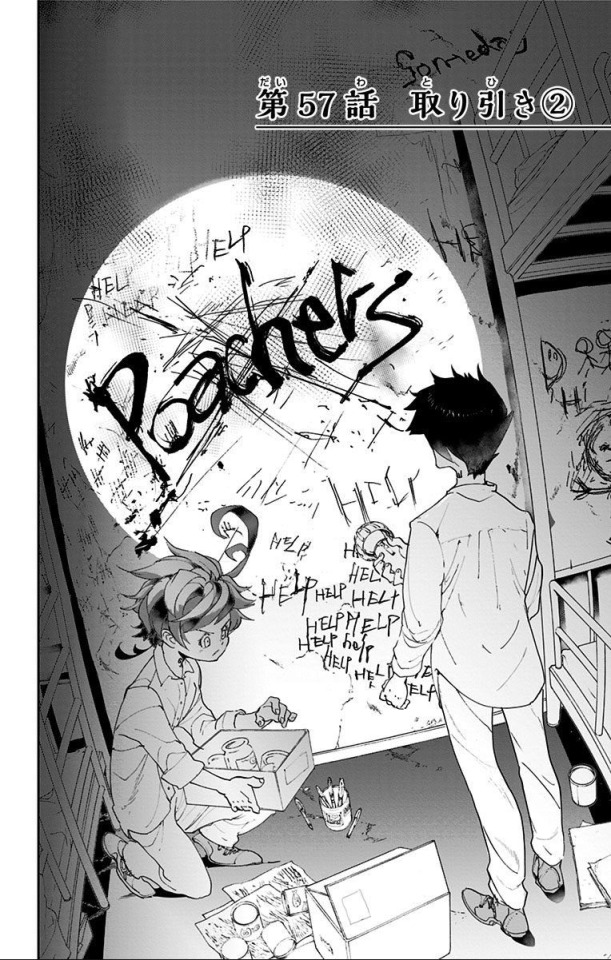
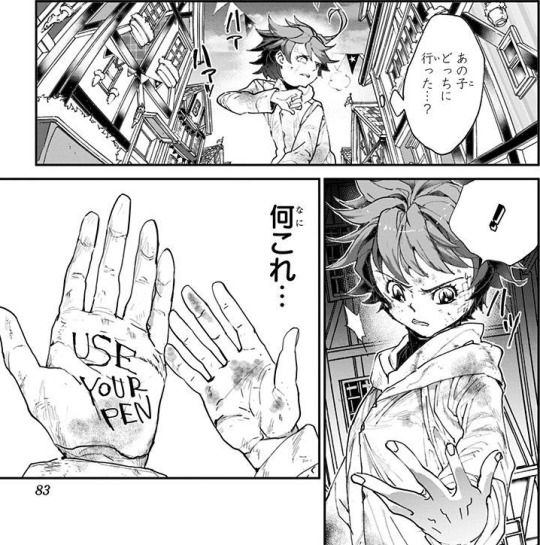
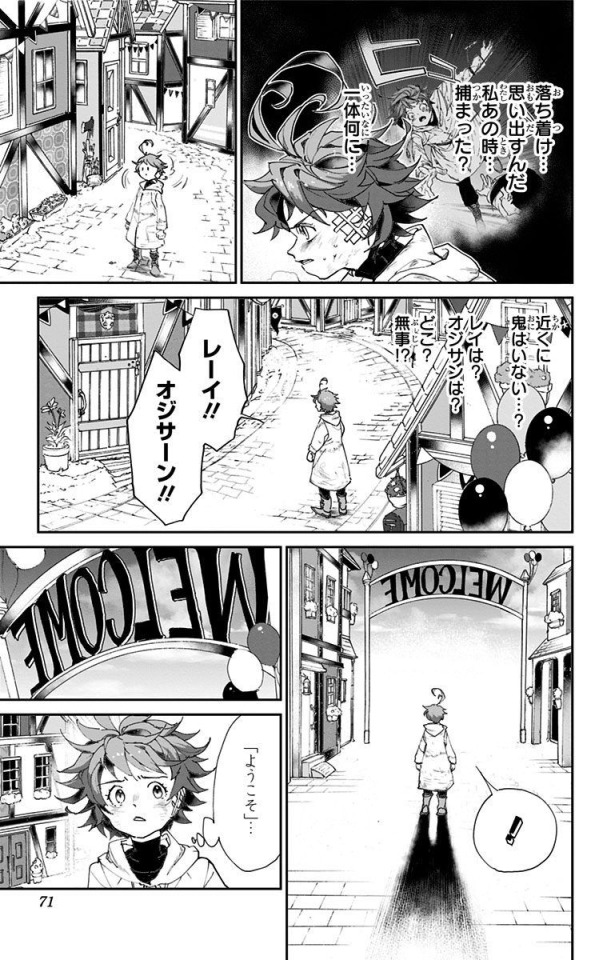
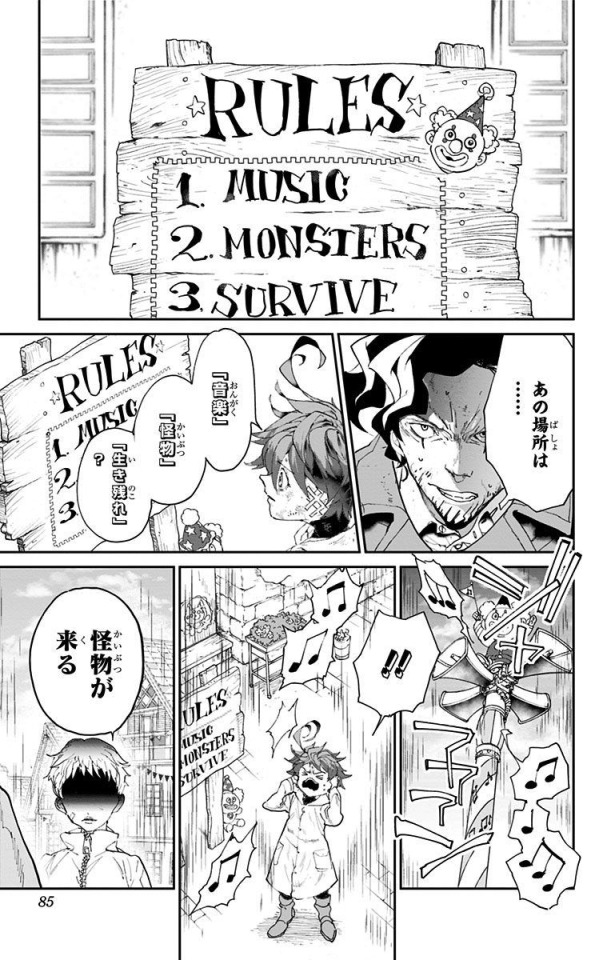
(Chapter 1 | 4 | 17 | 41 | 52 | 57 | 64 | 65)
However, Shirai's never said other languages weren't formally taught at Grace Field besides Latin:

(Mystic Code Book Chapter 4 Q&A)
And even if the children were being taught to the tests for commentary on standardized testing, you could argue the kids could learn on their own time if language books are classified under the arts based on the first light novel's description of the library's contents:

(TPN Light Novel 1: A Letter from Norman - “The Day Emma Cried”)
With the issue of "why didn't Ray ever bring up learning other languages after reading all the books in the library?" coming down to the same reason as this:

(Mystic Code Book Chapter 6 Q&A)
He just never brought it up. _(:△」∠)_
Also to promote @puff-poff's demon culture posts (found here and here):
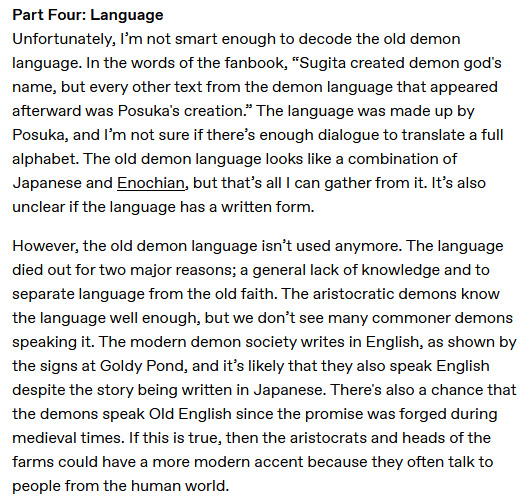
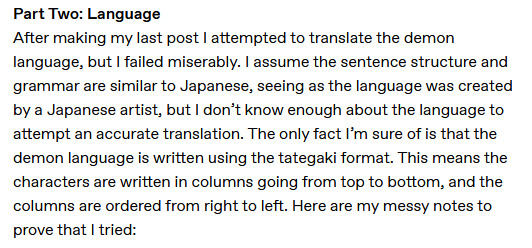


#like two months after you brought it up Owl my bad#The Promised Neverland#Yakusoku no Neverland#YnN#TPN#TPN Polls#FSS Polls#FSS Chatter#Long Post#Farm System#TPN 001#TPN 004#TPN 017#TPN 041#TPN 052#TPN 057#TPN 064#TPN 065#Mystic Code Book#TPN Light Novels#A Letter from Norman#The Day Emma Cried#Pre-Canon#Introduction Arc#Escape Arc#Promised Forest Arc#Search for Minerva Arc#puff-poff#Read More
20 notes
·
View notes
Note
#my friend rachel fullscoreshenanigans has a really good analysis post abt their development also. i will find it if i rember <3 #or she'll see this post and link it herself rachel fucking loves links. pspsps
hey can you let me fubking live
but here

YOUR ART IS SOOO SWEET AND YUMMY ive been sucked in by your raydon propaganda i need to hear more
OOOOOHG THANK YOU HELL YEAH !!!! JUMPING AROUND SO MUCH
and i am soooooo normal about raydon you have no idea<3 i've been meaning to make a more in-depth analysis on their dynamic and why i like them as a ship for someone else who asked but i haven't had the chance to organize all my thoughts yet </3
tbh the biggest thing is i just really like their development through the series because like. don is shown to really admire ray and obviously pre-escape ray is experiencing the horrors and is actively pushing everyone besides emma and norman away and i really like seeing them grow closer after ray is finally allowed to begin healing it's very sweet to me <3
their dynamic is just really good in general and i think it is very underappreciated. and in the context of romance specifically i like the idea of them finally being allowed to get to know each other and seeing don's admiration turn into genuine love while ray tries to process his feelings (and probably has a few crises over it<3) and i think don being such an openly affectionate and caring person would definitely help ray as he learns to handle recieving affection and giving it as well. also it's really sweet seeing how emotional ray makes don at several points in canon and i like thinking about him just being so overjoyed whenever ray shows him any sort of affection (and ray noticing this and making a mental note to do it more often <3)
tldr theyre both very sensitive people in different ways and their development is very sweet and the would be so good to each other and they are cute. also they are funny as fuck
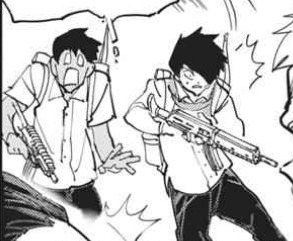
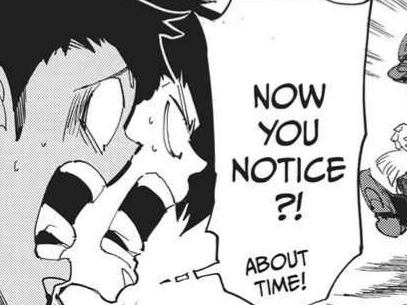

#i do appreciate links tho he's in so many games <3#that link is back when I was just directly screencapping panels from the VIZ website and the quality was shit#feel like tag might have a post like that too as the original time-honored torchbearer of RD respect 🙏#your tl;dr is perfect btw 🖤❤️#all the good stuff Don's got going on but I've never seen him crack the top 10 in a official character poll hmm I 🤔 wonder why 🤔🤔#contrast between the horrified faces#and how happy their gay bunny forms now that they embrace their true selves and love for one another is everything#Long Post#Goldy Pond Battle Arc#TPN 078#King of Paradise Arc#TPN 115#Raydon#Ray#Don#Little Bunny#FSS Chatter#goldiipond
27 notes
·
View notes
Text
#The Promised Neverland#Yakusoku no Neverland#YnN#TPN#TPN Polls#FSS Polls#FSS Shenanigans#TPN Cast#TPN Yuugo#TPN Gilda#TPN Don#TPN Nat#TPN Lannion#TPN Thoma#TPN Leuvis#TPN Gillian#TPN Nigel#TPN Sandy#TPN Barbara#TPN Cislo#Palvus#TPN Demon God#is it cheating to have Lanni and Thoma as a pair so I can fit Nat on here? you decide#but tbf I think this would be a paired activity for them in that they would egg each other on and collaborate more often than not so
35 notes
·
View notes
Text
Can be from you yourself, a canon character directly giving it to him, or him somehow acquiring it through the narrative.
#Ray and Norman with spectacles my beloveds‚‚‚#The Promised Neverland#Yakusoku no Neverland#YnN#TPN#TPN Polls#FSS Polls#FSS Shenanigans#TPN Ray#Ray TPN#YnN Ray#Ray 81194#Ray's Bday#TPN Birthdays
27 notes
·
View notes
Text
*Either all along or post-escape **Through being the reincarnation of James, one of his parents being a Ratri, or one of his more distant relatives being a Ratri
Really interested in the Other option as someone who came into the fandom after the series concluded and possibly missed some that were popular for a time and then dropped like a rock in the collective fandom conscience after a certain point.
#though being disproved by canon doesn't mean one still can't enjoy and play around with the theory#realize there's some overlap with things like “Norman was cloned in order to act as a vessel for James' consciousness after he died” etc.#but I only have 12 options#and the most prevalent ones are “these two characters are biologically related” variants already without getting into more specifics#The Promised Neverland#Yakusoku no Neverland#TPN#YnN#TPN Polls#FSS Polls#FSS Shenanigans#Emma and Carol are Bio Sisters Theory#Norman and Adam are Bio Brothers Theory#Adam and Norman Twins Theory#Norman Ratri#Leslie is Zazie Theory#TPN Norman#YnN Norman#TPN Emma#YnN Emma#Norman 22194#Emma 63194#Carol#Phil#Leslie#Zazie#Adam
65 notes
·
View notes
Text
After reading Kei Toda's book The Promised Neverland with a British/American Literature Scholar, specifically the third chapter focusing on gender:




I personally find it more thematically satisfying if it's the first option to further drive home the dystopian horror of the series equating a human's worth not only to arbitrary measures of intelligence via the narrow and rigid standardized tests the children at Grace Field are forced to take, but also to bioessentialism so the dissolution of the farm system can act as a rejection of both.
It feels very odd to me if the narrative makes a point to voice how boys are discard (during the present at least) and shows the casual indifference to the deaths of so many girls who try to rise to the rank of sister (described most plainly in Krone's chapter of the second light novel:)


would turn around and then be gender affirming to trans girls (and again, the feminism in the work being tied to the rejection of this system).
#this is also why I hc the GP crew are the most free in their expression of gender#since they've been removed from the system the longest#and why I hc none of the kids as having transitioned prior to escaping the farms#(though they might have been discreetly thinking about it prior)#from a pragmatic standpoint option 4 would probably be a thing if option 5 isn't#because logically speaking I can't tell you how the farm system has worked for a millennia#with 30 kids per year on average being shipped out from GF between the five plants#that collectively are raising ~200 kids at any given time in the present#Kei Toda#Reading The Promised Neverland with a British/American Literature Scholar#The Promised Neverland read with English and American Literature#TPN Polls#FSS Chatter#Farm System#TPN Light Novels#Pre-Canon#Moms' Song of Remembrance#Searching for the Skies of Freedom#TPN 181.2
16 notes
·
View notes
Text
*No, I hope he never does. There's too much pain there, and letting it go is part of him moving on and healing. **He does for a few people/his family so they know it existed and each person can decide their own relationship with it, but he never sings it again after that. ***Yes. It's a slow process, but eventually he transforms it into something healing, even with the sadness it carries. He's still fairly private about it, though. ****I have strong leanings toward no but could be swayed toward yes by a capable author/artist. *****I have strong leanings toward yes but could be swayed toward no by a capable author/artist.


(S1 Episode 10 | S1 Episode 12 | Chapter 37 | TPN Light Novel 2: Moms’ Song of Remembrance - “The Starry Sky and Leslie’s List”)
[Related post with thoughts on this] [Related poll about Ray's relationship with reading post-escape]
#filed under “shit that absolutely fucking eviscerates me for $2000‚ Alex”#The Promised Neverland#Yakusoku no Neverland#TPN#TPN Polls#FSS Polls#FSS Chatter#TPN Light Novels#Moms' Song of Remembrance#The Starry Sky and Leslie's List#TPN OST#Isabella's Lullaby#TPN Ray#Ray 81194#TPN Isabella#Isabella and Ray's Incredibly Fraught and Complicated Relationship Tag#Escape Arc#TPN S1#TPN S1e10#TPN S1e12#Pre-Canon#Post-Canon#TPN 037#Ray#Isabella
31 notes
·
View notes
Text






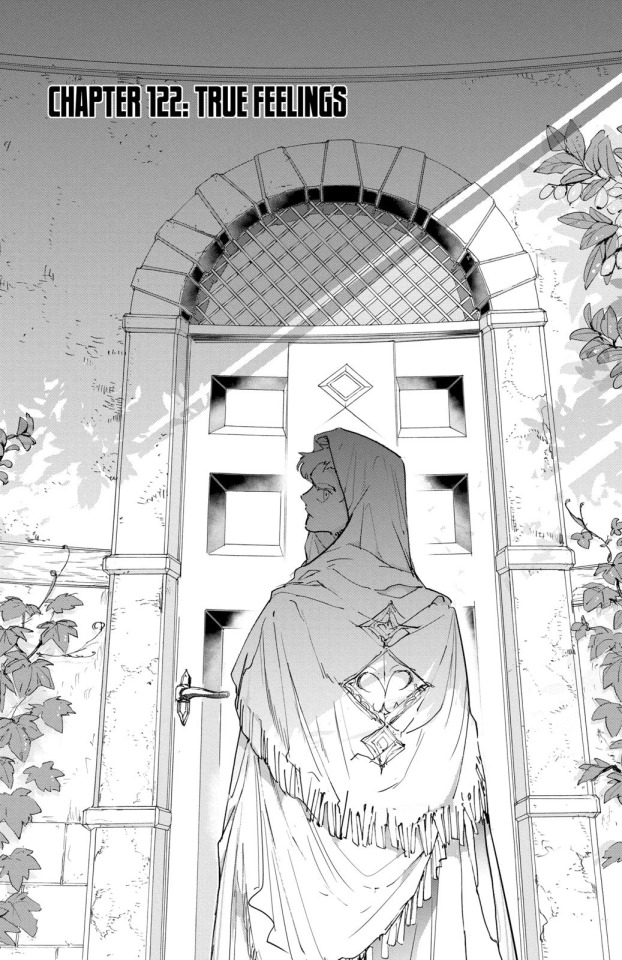





Assorted bits/trivia/propaganda: • Favorite volume cover poll can be found here, and favorite inner volume cover poll can be found here. • Chapter 47's art is Kaiu Shirai's favorite color chapter cover art per the "Tracks to the Neverland" exhibition book interview (from December 2020): "Amazingly drawn upper arms (and legs!) Everyone is drawn differently for their different ages! I adore the happy smiles of a mother and her daughters. It's a color page published on One Piece's 20th anniversary, so let me applaud the use of the straw hats and One Piece theme. I love it. Only Emma's hat is fringed and that's the best!" • Chapter 75's art is Demizu's fifth favorite color chapter cover art per the exhibition interview: "The theme was graduation, and I had a lot of trouble deciding the color of the clothes, which left a lasting impression on me. The color scheme is a bit mismatched thanks to the combination of bright colors like foreign uniforms and cherry blossoms, but I think I turned out beautifully." • Chapter 119 was the inspiration for the "The Guiding Star" short story originally published in Shounen Jump GIGA 2019 Summer Volumes 1–3 and eventually reprinted in the fourth light novel, "Films of Memories." (First part can be found here, translated by @presumenothing.) • I included the original spread of chapter 153 in WSJ because the "he is always alone" line kills me. This is also Shirai's fifth favorite color chapter cover art per the exhibition interview: "God. Representing Norman’s mental landscape like this..? I want to take a peek inside Demizu-sensei’s brain! The expression on Norman’s face, a burnt land's grief, frailty; Emma and Ray appearing there. It hit me so hard that I used the metaphor for the main story as well. I love it!" • Chapter 181 propaganda by @tutubola and some tag ramblings:
"i really like this actually. ray carrying one of the younger kids? norman w rolled up pants? the vulnerability???? all of them w rolled up pants/skirts actually. gilda looks so cute. and look at sherry she's so obsessed w norman it's so cute. i would make this more elaborate but i cant think rn be back in 46-79 business days (#it's the more-than-earned casualness of it all combined with it being one of those pictures you can hear the sound of #the soft ebb and flow of the waves and cry of the seagulls #with the warmth emanating from this scene of this family that against all odds was able to overturn destiny #and come out together just as close as not more so than where we started with them in the very first chapter #enhanced by the gentle hues of the setting sun to parallel the end of their long and hard-fought journey #and the warm air that's carried by an equally gentle sea breeze~ #shoutout specifically to seeing Anna‚ Don‚ Norman‚ and Ray naturally falling into their elder sibling roles #showcasing one of the fundamental cores of this series #healingly wholesome)
#The Promised Neverland#Yakusoku no Neverland#TPN#YnN#TPN Polls#FSS Polls#FSS Shenanigans#Posuka Demizu#約束のネバーランド#約ネバ#TPN Cast#Full Score Trio#Long Post#TPN 021#TPN 045#TPN 047#TPN 075#TPN 113#TPN 119#TPN 122#TPN 143#TPN 153#TPN 169#TPN 181#harder than I thought#a few of them are instant locks like Ch75‚ Ch113‚ Ch119‚ Ch153‚ and Ch181 with how distinctly I recall and frequently cite them#but then after that it got more difficult because of how much good art there is#Demizu rarely misses
30 notes
·
View notes
Text
*The Grace Field kids at each plant share the same surname, the other farms don't **Certain groups of kids adopt the same surname, but it's not based on their farm of origin
My thoughts on this from another post:
Grace or Gracefield feels like it would have too much baggage [for a surname] (unless whatever agency is doing this goes over their heads and does it anyway; the mixed bag of bitterness that could crop up from these people still seeing them as bound to that place when they altered fate to flee it), but I could get behind the kids in each Grace Field plant sharing a surname, Grand Valley kids sharing a surname, and then so on with Glory Bell, Goodwill Ridge, and Lambda. From purely an aesthetic perspective, it's cute thinking of the older kids initially trying to pick out ones for themselves, and then the younger siblings latching onto ones they're picking so they can remain close before they all eventually decide to come to a group decision. A legal one would probably take precedence though. At the very least, I feel the older Grace Field kids would want to ensure they had a say in the future of the younger ones, and this would be an additional layer of claim to that which is conveniently citable. The mass production farms are where it becomes more complicated with each one's size, but for convenience they might opt for this as well. Plus if any child wants to change their name in the future, that's always an option too.
#The Promised Neverland#Yakusoku no Neverland#TPN#YnN#TPN Polls#FSS Polls#FSS Chatter#FSS Shenanigans#TPN Cast#Grace Field Kids#Goldy Pond Resistance#Lambda Gang#Human World Arc#Post-Canon#feel like this can easily go lopsided with that last option covering all the bases#but I'm interested in whatever reasoning people may provide on how they think the kids arrive at these decisions
21 notes
·
View notes
Text
For the demon God name... I call them Elari. (Yes I stared at that nonsense of a word until it looked like a name).
Elari definitely sounds more prestigious than Marumaru lol

(Mystic Code Book Chapter 1)
I've also seen the demon language compared to Enochian (mentioned in @puff-poff's analysis of the demon world's culture, which I highly recommend people checking out).



And Kei Toda speculates it's related to Hebrew in The Promised Neverland read with English and American Literature (2020) by Kei Toda (the second chapter that discusses religion can be found here, translated by @thathilomgirl and @0hana0fubuki0).

Introducing her first from the Trio was a really good choice in my opinion, because her cheerful, hopeful, happy and naive personality makes you believe that everything in all right with their lives.
Establishing her as the main character is also so important for solidifying the series as a feminist narrative.
Just like I did with Ray... I have something unique to add to each drawing of her. First let's talk about the Freckles! I'm a big fan of interesting character traits, such us freckles, moles, scars, tooth gaps, vitiligo or anything similar to that. In the manga colouring above if you look closely, Emma has faint scars on her knees and elbows. Since she most likely do what her heart says before thinking, I imagine that she didn't mind if she scrapped her knees or bruised her elbow, while playing with her friends and family. Physically active kids often fall while playing but, falling hard then getting up again all by yourself is a good way to symbolise their in journey.
Ooo that is such a cool detail! I'm sure the demons eating premium meat would groan at seeing their meal in any way devalued with imperfections, but kids are going to be kids, and this especially makes sense for Emma.
Emma simply had to get into the Leader's role after Norman's shipment. I'm sorry to say that but Ray was a bit useless. He was lost in his own pain and gave up all hope (I mean… valid, but still), so she had to plan everything. Norman's letter and the other kids (Gilda, Don, Thoma, Lanni, etc) helped a lot, but she was practically alone.
While she is seen as the central leader/figurehead of this portion of the escape plan, I don't know if I'd phrase it as Emma being alone with how central collectivist efforts and solidarity are in the work, especially in this portion of the story. It feels like it devalues just how integral the rest of the Grace Field kids are to the plan and plays into the front the kids were hoping Isabella would buy into so that she wouldn't investigate further and discover their actual plans (i.e., that it was just one member of the trio behind the plan, and by getting rid of them it would crumble).





(S1 Episode 11 | S1 Episode 12)
It also goes against Shirai disavowing the narrow, arbitrary metrics the farm system uses in the form of the daily tests to evaluate children as the be all, end all of their worth, with the destruction of Grace Field (and later on the farm system as a whole) acting as a symbolic rejection of that worldview, and against Emma's core values that drove her to stake everything on saving all of her family, not just the trio like Norman initially suggested as a matter of practicality.
My forever favourite moment (Idk why didn't I mention this in the Brainrots part 1) is Emma slapping some sense into Ray (pun intended😁). Like that setting and that scenery is my Roman Empire.
She smacked him hard enough all the remaining lighter fluid right out of his hair 🤣😭🤣😭

10/10 moment, peak comedy tbqh.
TPN Brainrots part 2:
Warning: just like the in the previous part... There will be Manga Spoilers.
Since I was unable to finish part 3 of my comic for Emma's birthday (due to being in a place where bringing a laptop was not advised) I will do my head canons and theories on her.
So today's post is about: Emma

Emma is a protagonist in the wrong genre. That was my first thought when I finished season 1 for the first time. Of course now I know how much more complicated her personality is. Introducing her first from the Trio was a really good choice in my opinion, because her cheerful, hopeful, happy and naive personality makes you believe that everything in all right with their lives. Her point of view up until Connie's death really shows how easy it is to believe in a comfortable lie. (not to forget that in canon they're 11-12)
Emma's appearance explained:
Just like I did with Ray... I have something unique to add to each drawing of her. First let's talk about the Freckles! I'm a big fan of interesting character traits, such us freckles, moles, scars, tooth gaps, vitiligo or anything similar to that. Also the red/orange hair🧡! My second favourite hair color in anime & character history (first is black🖤).
When colouring I like to use vivid colours for her clothes (mostly red or orange to bring out her hair). Maybe that's why, my favourite outfit is what she wore in the Goldy Pond Arc.
In the manga colouring above if you look closely, Emma has faint scars on her knees and elbows. Since she most likely do what her heart says before thinking, I imagine that she didn't mind if she scrapped her knees or bruised her elbow, while playing with her friends and family. Physically active kids often fall while playing but, falling hard then getting up again all by yourself is a good way to symbolise their in journey. (Old drawing of mine😅⬇️)
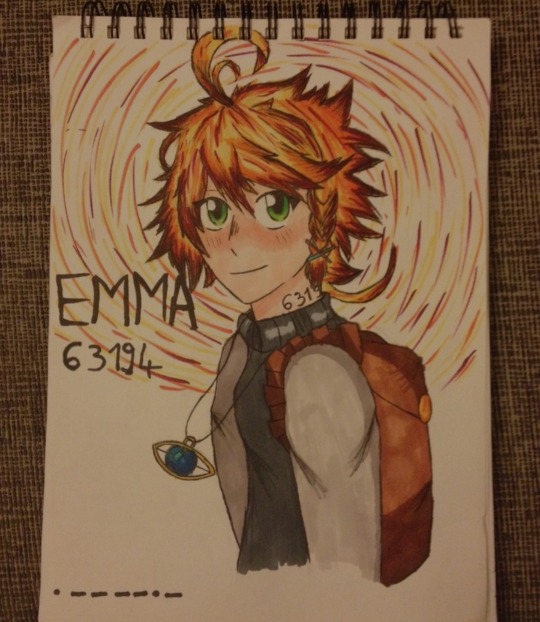
Leader of the Grace Field Group:
Emma simply had to get into the Leader's role after Norman's shipment. I'm sorry to say that but Ray was a bit useless. He was lost in his own pain and gave up all hope (I mean... valid, but still), so she had to plan everything. Norman's letter and the other kids (Gilda, Don, Thoma, Lanni, etc) helped a lot, but she was practically alone. She couldn't even grieve Norman properly. Don't forget that Emma is smart and an amazing actor. She fooled Isabella thinking she gave up too (not to mention that time she slowed her heartbeat so Mom doesn't know she was lying).
My forever favourite moment (Idk why didn't I mention this in the Brainrots part 1) is Emma slapping some sense into Ray (pun intended😁). Like that setting and that scenery is my Roman Empire. Her catching a burning match just in time, not caring about burning her hand, then convincing Ray to excape with her and the rest of the group (Okay actually... let's be honest... she basically had to drag him out of the House). The first glimpse of what Emma is capable on her own. Nerves of steel for cutting her ear off too (her first big sacrifice just to save the others).
After the Excape, she got a lot of help from Ray who also apologised for his behaviour. The two of them comforting each other after thinking Norman died is just such a heart warming scene. Meeting with Sonju and Mujika was a big turning point for Emma, because of three things;
1: Okay first she was scolded because of her recklessness as well as Ray for trying to play the hero, but that not strongly Mujika or demon related. The world opened up for the whole group. They learnt about the Promise and how the world was divided into two.
2: Emma learned and saw from first hand, that not all demon are evil. Mujika helped them despite their differences and the end of that week Emma thrusted her so much she even showed her the photographs of her family and told her about Norman too.
3: Receiving the neklace and the advice to search for the Seven Wall while they're on their journey.
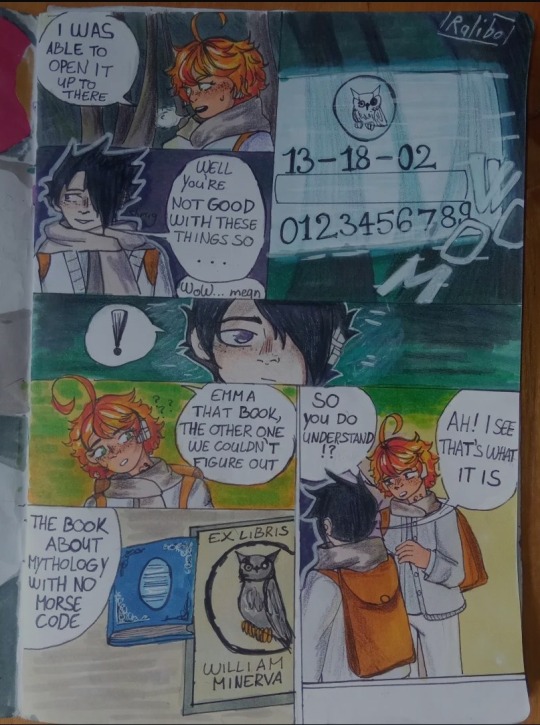
Arriving to B06-32 and meeting Mister/Yuugo there was a new challenge. All the kids saw another 'Isabella' who tried to kill them. Emma, then Ray were the first ones who saw through his facade.
Goldy Pond Arc was Emma time to shine as a leader and as an individual too. Meeting Lucas and the Goldy Pond squad and immediately connecting to them shows how much she cares about others. Her bonding time with Lucas as they uncover the mysteries surrounding the identity of William Minerva.
Fun fact: In my fanfic I like to age up the Grace Field Trio roughly to Oliver's age, because I think this way their personalities are more dominant and clear.
Emma's relationship with adults:
I like to think that Emma never saw Isabella as a monster (not even after discovering the truth). And as truthful as it is. I think Isabella formed a deeper bond with Emma than with her own son. That's because from the Grace Field Trio, only Emma could have been saved by Mom. With the Mom/Sister Program, Emma would have been able to live on, but it's against her nature to harm anyone. Although I found it interesting that that was the original composition of the manga. Emma becoming a Mom and Gilda becoming a Sister (correct me if I know this wrong). Also this picture under... I found it on Pinterest and it's reflects back to my theory of what might happen to the boys.
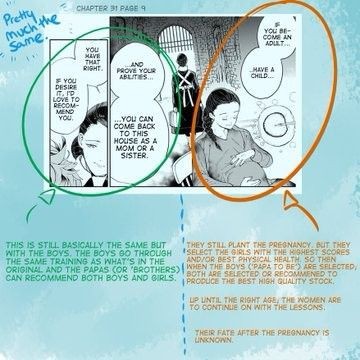
Meeting Yuugo and Lucas were a complete different experience for the Grace Field kids. The Bunker Dads were the caring parents both group (Grace Field & Goldy Pond) needed and deserved. Not to mention how Emma reminds me both the young and hopeful Yuugo from the past and the clever and patient Lucas of the present. Spending almost two years on the B06-32 shelter while searching for the Seven Wall makes their last goodbye 1000% more heart breaking.
Back to Grace Field Arc is when Emma meets Isabella again. She gets closer slowly but she doesn't have an emotional barricade as high up as Ray or even Norman. Emma forgave her easier, but that doesn't mean she justified the things Mom did with her family. She simply realised that Isabella had no other choice if she wanted to stay alive.
Making the new Promise and the Human World:
First of all King of Paradise Arc? Realising that Norman is still alive?! Oh the the happy tears when I first read that🖤🤍🧡. (Although to tell the truth Ray slapping Norman as soon as he sees him was such a right choice in my opinion) Emma breaking down in tears and hugging Norman was such an emotional and wholesome scene. But the argument after... let's just say I don't like miscommunication and/or characters keeping important secrets to themselves. (*glances at the GF Trio* "All three of you is in trouble")
Ohh Seven Wall Arc my beloved 🧡🖤. I like every bit of this story but Seven Wall Arc holds a special space in my heart. That Arc still holds so much potential to play around. The demon God's power to manipulate time, space and play around with Emma's and Ray's memories was wild. For the demon God name... I call them Elari. (Yes I stared at that nonsense of a word until it looked like a name). It was such a nice touch that the demon God only wanted to talk to Emma, but I couldn't help but feel a bit bad for Ray, because I think he was worried as hell when he woke up alone without Emma on his side. (I also sometimes think about what kind of Reward he would have received if he stayed with Elari).
The Reward Emma got is... without a question... cruel, and I think it was not needed, but I also can't think about something else what she could have gave to Elari if not her memories.
She deserves happiness and I can't say how much I cried when the Ray and Norman + everyone else found her in the human world. In the end I'm happy that Emma and all of them got a relatively happy ending.
Head canon to Human World and Reward: Emma's necklace!! It holds her memories. They just somehow have to find a way to unlock it.
HAPPY BIRTHDAY TO EMMA!!!🧡🧡🧡.
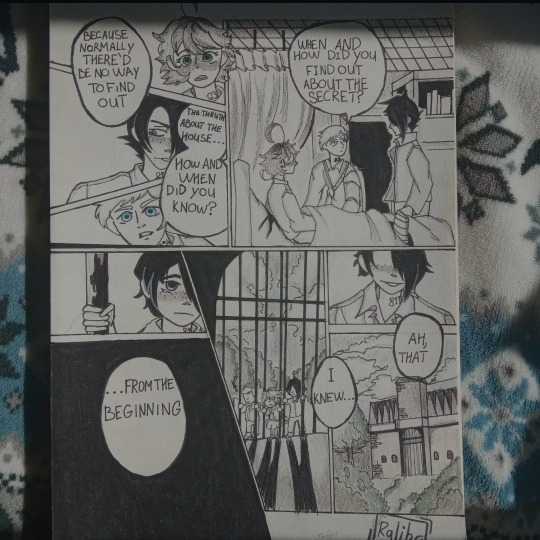
Okay. That's it for Emma. If you have anything else to add, correct or you want to share your own theories just write it in the comments or reblogs. Next post will be the 3rd part of the comic. Then brainstorms on Norman will come.
#aaah Elari really does sound cool though#already said this on your original post featuring it but the addition of tears in the Ch14 cover art; bby girl </3#the variety in book cover colors along with Emma's homing beacon hair does a lot to brighten the panel up#love seeing people's thoughts on the ending re: the reward it's why I made my most recent poll#also love your old drawing of Emma her hair looks so fiery and vibrant with the coloring#Long Post#Manga Panel Coloring#TPN Demons#TPN Demon God#Mystic Code Book#Kei Toda#The Promised Neverland read with English and American Literature#Emma#Ray#Big Sis Emma Tag#Grace Field Kids#TPN S1#Escape Arc#TPN S1e11#TPN S1e12#TPN 014#Human World Arc#FSS Chatter#freckled Emma my beloved 🧡🧡#Read More#ralibo14
23 notes
·
View notes